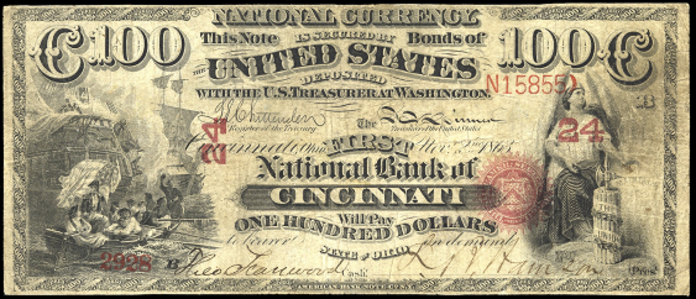One Hundred Dollar Notes › Nationals › 1863 One Hundred Dollar Original Series National Bank Notes › New York Charters › 1863 $100 Schenectady New York Mohawk National Bank
Get Value Now
| Item | Info |
|---|---|
| Series | 1863 |
| Charter | #1226 Mohawk National Bank of Schenectady, New York |
| Year Chartered | 1865, 944 Banks Chartered |
| City Info | Schenectady is a city in Schenectady County, New York, United States, of which it is the county seat. As of the 2010 census, the city had a population of 66,135. The name "Schenectady" is derived from a Mohawk word skahnéhtati meaning "beyond the pines". The city was founded on the south side of the Mohawk River by Dutch colonists in the 17th century, many from the Albany area. They were prohibited from the fur trade by the Albany monopoly, which kept its control after the English takeover in 1664. Residents of the new village developed farms on strip plots along the river. Source: Wikipedia |
| Similar Cities | City name is unique, no others like it. |
| Seal Varieties | Red with rays |
| See Also | If your note doesn't match try: 1. 1863 $100 Compound Interest Treasury Note 2. 1864 $100 Compound Interest Treasury Note 3. 1863 $100 Gold Certificate 4. 1861 $100 Interest Bearing Note 5. 1863 $100 Interest Bearing Note 6. 1864 $100 Interest Bearing Note |
| Other Info | 1. Value depends on notes known for charter, condition and market demand. |
| Neat Fact | Engraved date is when bank was organized, a 20 or 40 year anniverary of its organization, or date of title change (Kelly, 5th Ed. P 5 & Huntoon 1995). |
No Obligations Offers and Appraisals
Please submit a good photo or scan. It will be identified and evaluated. Understand there may be subtle differences between the image you see above and your note. Signatures, design, markings and note condition will determine the offer price. Notes in Uncirculated or better condition receive the best offers.
Appraisals can be estimated for wholesale and retail prices. Wholesale is what dealers typically pay. Retail is what a collector might pay. Retail is slightly higher in most cases.
Please visit this page for USA Paper Money Reference. Do not treat this page as a reference guide, it is for appraisal and acquisition purposes only.
